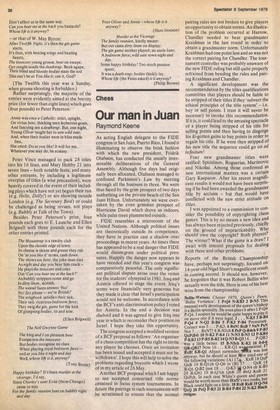Chess
Our man in Juan
Raymond Keene
As acting English delegate to the FIDE congress in San Juan, Puerto Rico, I found it illuminating to observe the brisk fashion with which the new president, Fridrik Olafsson, has conducted the usually interminable deliberations of the General Assembly. Although five days had originally been allocated, Olafsson managed to confound Parkinson's Law by steering through all the business in three. We were thus faced by the grim prospect of two days sunbathing on the private beach of the Sae Juan Hilton. Unfortunately we were overtaken by the even grimmer prospect of Hurricane David which drove us indoors, while palm trees plummeted outside.
FIDE resembles a microcosm of the United Nations. Although political issues are theoretically outside its competence, they have in practice cast a shadow over proceedings in recent years. At times there has appeared to be a real danger that FIDE would disintegrate under political pressures. Happily the danger now appears to have receded and this year's congress was comparatively peaceful. The only significant political dispute arose over the venue for the students' olympiad in 1981.1raq and Austria offered to stage the event, Iraq's terms were financially very generous but they made it clear that Israel's participation would not be welcome. In accordance with the BCF's anti-discrimination policy I voted for Austria. In the end a decision was shelved and it was agreed to give Iraq one year in which to reconsider their position on Israel. I hope they take this opportunity.
The congress accepted a modified version of a BCF proposal as follows: 'An organiser of a chess competition has the right to invite any player he chooses. Once an invitation has been issued and accepted it must not be withdrawn'. I hope this will help to solve the problems regarding boycotts which I wrote of in my article of 26 May.
Another BCF proposal which I am happy to see accepted concerned title norms obtained in Swiss system tournaments. In future the pairings in such tournaments will be scrutinised to ensure that the normal pairing rules are not broken to give players an opportunity to obtain norms. An illustration of the problem occurred at Harrow, Chandler needed to beat grandmaster Kraidman in the last round in order to obtain a grandmaster norm. Unfortunately Kraidman had one point less and so was not the correct pairing for Chandler. The tournament controller was probably unaware of the new FIDE ruling but still quite properly refrained from bending the rules and pairing Kraidman and Chandler.
A significant development was the recommendation by the titles qualifications committee that players should be liable to be stripped of their titles if they 'subvert the ethical principles of the title system' — i.e. buy or sell points. I trust it will never be necessary to invoke this recommendation. If it is, it could lead to the amusing spectacle of a player being stripped of his title for selling points and then having to disgorge his ill-gotten gains to buy points in order to regain his title. If he were then stripped of his new title the sequence could go on ad infinitum!
Four new grandmaster titles were ratified: Spiridinov, Roguerias, Martinovic and Nikolac. Among those confirmed as new international masters was a certain Gary Kasparov. After his recent magnificent results it would not have been surprising if he had been awarded the grandmaster title by acclaim — but that would have conflicted with the new strict attitude on titles.
I was appointed to a commission to con sider the possibility of copyrighting chess games. This is by no means a new idea and has always been rejected previously, chiefly on the ground of impracticability. Who should own the copyright? Both players? The winner? What if the game is a draw? I await with interest proposals for dealing with these and other problems.
Reports of the British Championship have, perhaps not surprisingly, focused on 14-year-old Nigel Short's magnificent result in coming second. It should not, however, be forgotten that it was Robert Bellin who actually won the title. Here is one of his best wins from the championship.
Bellin-Watson: Chester 1979, Queen's Pawn, 'Benin Variation'. 1 P-Q4 N-KB3 2 B-N5 This unusual early development of the queen's bishop is a Bellin speciality. He even plays it after 1 P-04 p.Q4. I suspect he would be quite happy to play it on move one it it were legal. 2 . . N-K53 11-134 P-Q4 4 N-Q2 B-04 5 P-K3 P-B4 Premature. Correct was 5 . . P-K3. 6 BxNl Rx13 7 INILN POT Not 7 . . . BxN?? 8 B-N5ch 8 PxP Q-R4ch 9 P-B3 QxP(84) 10 N-IC2 P-K4 11 N-N3 B-N3 12 P-KR4 P-K113 13 P-R5 B-R2 14Q-N3 B-Q314... P-QR3 was a little better. IS B-NSch K-K2 16 0-0-0 QR-Q017 Now 16 . KR-Ql waiNgssential. 17 Rx13! KR-Q1 Abject surrender. .40Mck was lost anyway, but he should at least lVe tried one of the following variations: (A) 174. . KxR 180K? QxB 19 R-Q1 ch Q-Q6 or (B) 17 , . . ClexR 18 R-Q1 Q-B2 (not 18 . Q-K3,-N4 eh K-B3 20 R-Q6) 19 R-Q7ch Qxlt 211 Bx() KxB 21 QxPch, In each case White's queen and pawns would be worth more than Blaeles two rooks, but Black could fight on a little. 18 RxR BAR 19 Q-M QxiQgn2s0 PxQ P-R3 21 B-R4 P-04 22 N-K2 Black
resigns.


































 Previous page
Previous page